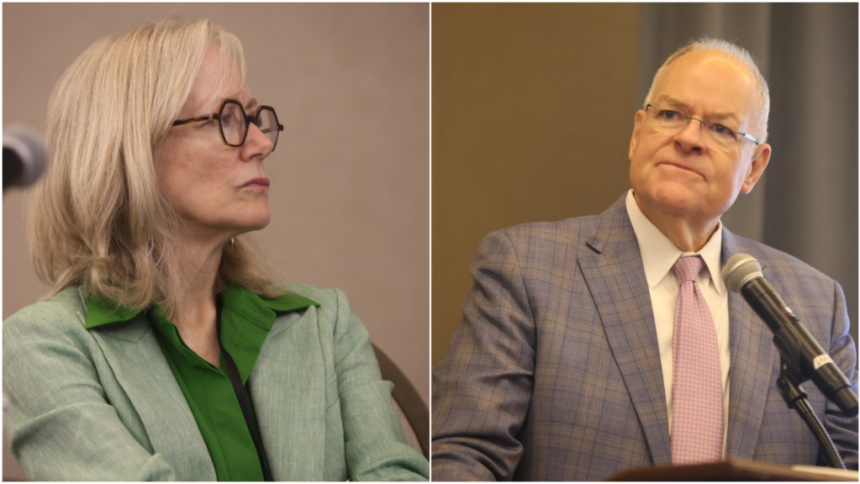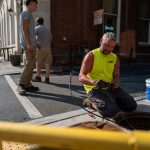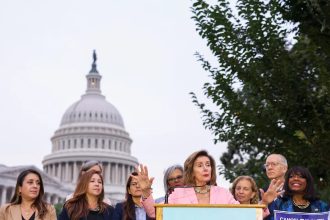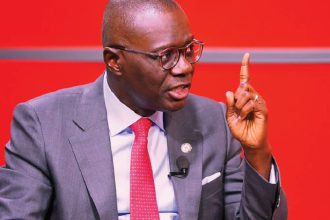Pictured from left: Author Kathleen deLaski and Dr. Bill Hazel, CEO of Claude Moore Opportunities and former Virginia Secretary of Health, at a summit in Richmond on Sept. 19, 2025. (Photos by Nathaniel Cline/Virginia Mercury)
Workforce development and education leaders said during a Friday summit that Virginia needs to shake things up to continue meeting the surging health care workforce demand across the commonwealth, while also making it easier for educational institutions to offer programs that diverge from the traditional college preparation route.
According to a study by George Mason University’s Center for Health Workforce, Virginia needs more than 17,000 registered nurses and 10,000 medical and human services managers.
Kathleen deLaski, the author of “Who Needs College Anymore?” recommended the “step-ladder” approach to higher education as a method to consider moving into the future during Claude Moore’s annual health care workforce summit in Richmond.
“We need a step ladder approach to college,” deLaski said. “Rather than being afraid or concerned that they’re going to go out of business if they add products or services besides four-year degrees or two-year degrees, (colleges) should embrace the array of offerings that they could be providing for all. Not just the elite or the middle class, but all types of learners.”
deLaski said she did not write her book to discourage people from going to college, but rather to serve as a “wake-up call” for higher education, noting that 60% of Americans do not complete college.
She noted that the country’s policy system favors funding four-year institutions over short-term and workforce development programs.
However, recent federal reform efforts are expanding Pell Grants to workforce training programs, changes that could begin as early as next summer. Another reform measure for colleges and universities: the government will verify whether graduates are actually earning a decent income afterward. The U.S. Department of Education extended the reporting deadline to Sept. 30.
Panelists, including Virginia Secretary of Education Aimee Guidera, Virginia Community College System Chancellor David Doré, and Lesa Hanlin, executive director of strategic initiatives and corporate relations at the University of Virginia, discussed some of the barriers and possible solutions, including challenging what has become the norm in education.
Virginia Secretary of Education Aimee Guidera at a summit in Richmond on Sept. 19, 2025. (Photo by Nathaniel Cline/Virginia Mercury)
Guidera said one way Gov. Glenn Youngkin’s administration proposed a new method was successfully encouraging the General Assembly to back and fund the establishment of the laboratory schools, which are developed and operated in partnership with colleges and universities and designed to offer students tuition-free specialized instruction for high-demand careers like teaching, computer science and technology. Legislation to establish lab schools in Virginia first passed in 2012 under former Gov. Bob McDonnell.
“Lab schools are basically what people are doing every single day, which is connecting the dots, bringing people together saying ‘how can we invest in people so they are ready for the jobs in healthcare,” Guidera said, adding that she hopes funding will continue with the next administration.
“Lab schools, apprenticeships, internships, partnerships — this is what’s critical to get over the inertia of ‘keep doing education’ and saying what we’ve always been doing because it’s not working what we have been doing, and this is the future,” Guidera added.
Former Del. Kathy Bryon, who was one of the panelists, carried a few pieces of successful legislation around workforce development including one to create the state’s FastForward, a short-term career credential training program, and another measure that led to the development of the Department of Workforce Development and Advancement, or Virginia Works, to centralize oversight of workforce development programs and data systems.
Byron, now a deputy commissioner with Virginia Works, said employers are telling the team that a college degree by itself is no longer the right indicator of readiness.
“What matters is the skills they bring, the competences they bring, the experiences that they bring on the job,” Byron said.
Panelists also shared a consistent theme of changing the narrative to ensure all Virginians — from students to parents, veterans, to new career seekers — understand that entities, including the Virginia Community College System, are here to support them.
The event attracted more than 100 stakeholders from school systems and businesses around Virginia.
Bill Hazel, CEO of Claude Moore Opportunities and former Virginia Secretary of Health, said in a statement that the event was an “amazing gathering” of people focused on creating “family sustaining career opportunities” while meeting the state’s health care needs.
“There are rewarding and critically needed positions waiting to be filled throughout the healthcare system, but too often people don’t know how to get the training and credentials they need, or face barriers that keep them out of the healthcare workforce,” Hazel said. “When we invest in flexible, accessible career pathways in healthcare, we lift more Virginians into the middle class and help our fellow Virginians live healthier lives.”
SUBSCRIBE: GET THE MORNING HEADLINES DELIVERED TO YOUR INBOX









